

A Brief History of Atheism — Nick Spencer, BBC Historian. Resource. A level theme 2f new atheism rs review sept 2013. 01 Atheism. The Root of All Evil - The God Delusion (full length) Radical thinkers: Ludwig Feuerbach on religion. Beyond Belief, Atheism. “The Word on Fire Show" w/ Bishop Robert Barron. Richard Dawkins. Richard Dawkins: Best arguments against religion/faith #1. Bishop Barron on The New Atheists. Real Time with Bill Maher (Web Exclusive) BBC Radio 4 - In Our Time, The Age of Doubt. Atkins P Deceptions of religion. Atheism textbook. Newman is the antidote to Nietzsche. I first came across the name John Henry Newman in primary school.
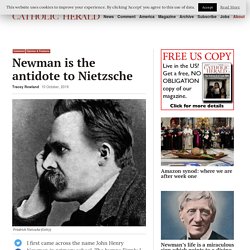
The hymns Firmly I Believe and Truly and Praise to the Holiest were often sung at our school Masses. Q and A with Dr. Craig: Richard Dawkins' Argument for Atheism in The God Delusion. By William Lane Craig Q: What do you think of Richard Dawkins' argument for atheism in The God Delusion?
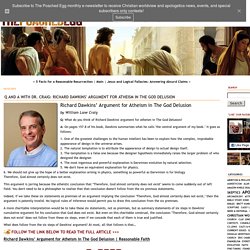
Understanding Unbelief – Understanding Unbelief is a major new research programme aiming to advance the scientific understanding of atheism and other forms of so-called ‘unbelief’ around the world. Welcome to the Understanding Unbelief programme website Understanding Unbelief is a major research programme aiming to advance the scientific understanding of atheism and other forms of so-called ‘unbelief’ around the world.
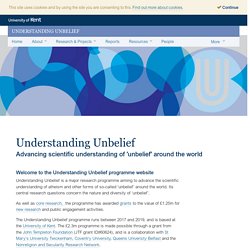
Its central research questions concern the nature and diversity of ‘unbelief’. As well as core research, the programme has awarded grants to the value of £1.25m for new research and public engagement activities. The Understanding Unbelief programme runs between 2017 and 2019, and is based at the University of Kent. The £2.3m programme is made possible through a grant from the John Templeton Foundation (JTF grant ID#60624), and is a collaboration with St Mary’s University Twickenham, Coventry University, Queens University Belfast and the Nonreligion and Secularity Research Network. Understanding Unbelief programme introduction.
Think on these things: A comparison of 'God Is Not Great', by Christopher Hitchens, and 'The Rage Against God', by Peter Hitchens. IntroductionEpiphanies – How each man lost or (re)gained his faith'Yes, I believe, but what do I believe?
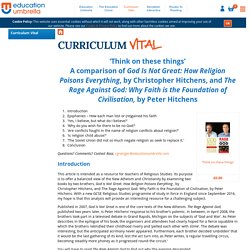
''Why do you wish for there to be no God? ''Are conflicts fought in the name of religion conflicts about religion? ''Is religion child abuse? ''The Soviet Union did not so much negate religion as seek to replace it.' Does Religion Make Bad Scientists? 1.
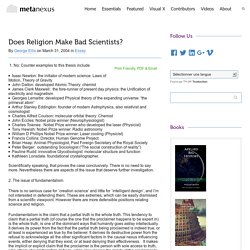
No: Counter examples to this thesis include Scientifically speaking, that proves the case conclusively. There is no need to say more. Nevertheless there are aspects of the issue that deserve further investigation. 2. There is no serious case for `creation science’ and little for `intelligent design’, and I’m not interested in defending them. Word on Fire. The Four Horsemen review - whatever happened to ‘New Atheism’?
Whatever happened to “New Atheism”?

It was born in the febrile aftermath of 9/11, when belief in a deity – or, let’s be honest, specifically in Allah – seemed to some people a newly urgent danger to western civilisation. Sam Harris began writing The End of Faith (2004) immediately after the World Trade Center attacks, and it became a bestseller. There followed the philosopher Daniel Dennett’s Breaking the Spell, Richard Dawkins’s The God Delusion, and Christopher Hitchens’s God Is Not Great. The men toured vigorously, but they all met together only once, and this book is the transcript of what ensued, with new brief introductions by the surviving members, Hitchens having died in 2011.
Contrary to the book’s subtitle, the “atheist revolution” was not sparked by this cocktail-fuelled pre-dinner round of chat and backslapping, which took place in 2007. New Atheism’s arguments were never very sophisticated or historically informed. What did they all do next? The folly of pretence. As I explain in the chapter by that title in Breaking the Spell, "belief in belief" is a common phenomenon not restricted to religions.
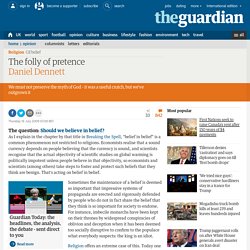
Economists realise that a sound currency depends on people believing that the currency is sound, and scientists recognise that the actual objectivity of scientific studies on global warming is politically impotent unless people believe in that objectivity, so economists and scientists (among others) take steps to foster and protect such beliefs that they think are benign. That's acting on belief in belief. A passionate atheist's case against religion. It's all in good fun when Dawkins mocks a buffoon like Pat Robertson and fundamentalist pastors like the one who created "Hell Houses" to frighten sin-prone children at Halloween.
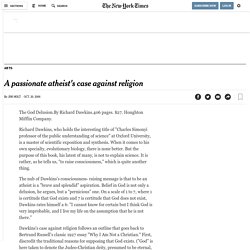
But it is less edifying when he questions the sincerity of serious thinkers who disagree with him, like the late Stephen Jay Gould, or insinuates that recipients of the million-dollar-plus Templeton Prize, awarded for work reconciling science and spirituality, are intellectually dishonest (and presumably venal to boot). In a particularly low blow, he accuses Richard Swinburne, a philosopher of religion and science at Oxford, of attempting to "justify the Holocaust," when Swinburne was struggling to square such monumental evils with the existence of a loving God. Perhaps all is fair in consciousness-raising. But Dawkins's avowed hostility can make for scattershot reasoning. Moreover, in training his Darwinian guns on religion, he risks destroying a larger target than he intends. Terry Eagleton reviews ‘The God Delusion’ by Richard Dawkins · LRB 19 October 2006.
Imagine someone holding forth on biology whose only knowledge of the subject is the Book of British Birds, and you have a rough idea of what it feels like to read Richard Dawkins on theology.
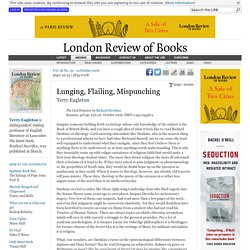
Card-carrying rationalists like Dawkins, who is the nearest thing to a professional atheist we have had since Bertrand Russell, are in one sense the least well-equipped to understand what they castigate, since they don’t believe there is anything there to be understood, or at least anything worth understanding. This is why they invariably come up with vulgar caricatures of religious faith that would make a first-year theology student wince. Mapping the Incarnation: How the Christian Narrative Makes Sense of our World – Opinion – ABC Religion & Ethics. Alister McGrath is Andreas Idreos Professor of Science and Religion at the University of Oxford.
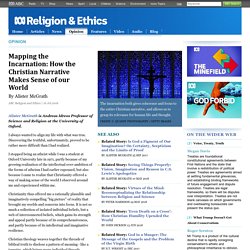
I always wanted to align my life with what was true. Discovering the truthful, unfortunately, proved to be rather more difficult than I had realized. I stopped being an atheist while I was a student at Oxford University late in 1971, partly because of my growing realization of the intellectual over-ambition of the forms of atheism I had earlier espoused, but also because I came to realize that Christianity offered a way of making sense of the world I observed around me and experienced within me.
Christianity thus offered me a rationally plausible and imaginatively compelling "big picture" of reality that brought my worlds and concerns into focus. It is not so much a collection of isolated individual beliefs, but a web of interconnected beliefs, which gains its strength and appeal partly because of its comprehensiveness, and partly because of its intellectual and imaginative resilience. We can save atheism from the New Atheists like Richard Dawkins.
Why are the New Atheists such jerks? Case in point: Richard Dawkins’ continuing pursuit of Ahmed Mohamed, the Texas 14-year-old humiliated in school after authorities mistook his homemade clock for a bomb. The other day, The God Delusion author called Ahmed a hoaxer and responded to suggestions “he was only a kid” by linking to a report about a juvenile Islamic State (Isis) fighter. “And how old is this ‘kid’?” Dawkins asked. Faraday Paper 9 McGrath EN. Richard Dawkins has lost: meet the new new atheists. Atheism. The term “atheist” describes a person who does not believe that God or a divine being exists. Worldwide there may be as many as a billion atheists, although social stigma, political pressure, and intolerance make accurate polling difficult. A Tale of Two Hitchens. A Tale of Two Hitchens By Rev. Robert Barron I’ve written often about Christopher Hitchens, the world’s most prominent atheist. Most recently, I did a piece on the CNN blog, urging Christians to pray for Hitchens as he battles a very serious form of cancer—and to my astonishment, this benign recommendation was met with an extraordinarily negative reaction from atheists.
But that’s a story for another day. Whereas Christopher has a rather baroque literary style, his brother writes soberly and directly. Dawkins’ Delusion. Richard Dawkins has emerged as the enfant terrible of the movement known as the New Atheism. His best-selling book The God Delusion has become the literary centerpiece of that movement. In it Dawkins aims to show that belief in God is a delusion, that is to say, "a false belief or impression," or worse, "a persistent false belief held in the face of strong contradictory evidence. "1 On pages 157-8 of his book, Dawkins summarizes what he calls "the central argument of my book. " Note it well. If this argument fails, then Dawkins' book is hollow at its core. And, in fact, the argument is embarrassingly weak.
It goes as follows: 1. 2. 3. 4. New Atheists, The. The New Atheists are authors of early twenty-first century books promoting atheism. These authors include Sam Harris, Richard Dawkins, Daniel Dennett, and Christopher Hitchens. Atheism DIscussion cards. RelSR 10 1 poster New Atheism. Evaluate the success of the atheistic argument against religious belief 2. Atheism ao2 eduqas. RSRev 10 1 Grade booster extension.